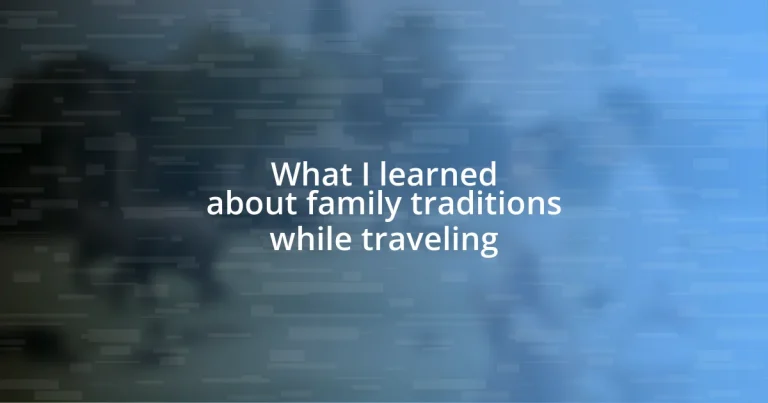Key takeaways:
- Family traditions connect us to our heritage, foster emotional bonds, and shape our identity through shared experiences and values.
- Traveling enhances family bonding and appreciation for different cultures, creating opportunities for meaningful exchanges and new perspectives.
- Documenting and incorporating traditions during travels enriches experiences and preserves family narratives, ensuring the legacy of shared moments is honored for future generations.

Understanding family traditions
Family traditions are the threads that weave the tapestry of our lives, connecting us to our past and anchoring us in the present. I remember a summer trip to my grandparents’ house, where every evening we’d gather for a meal that started with my grandmother’s signature dish—a recipe passed down through generations. It made me realize how food isn’t just about sustenance; it’s about sharing stories and creating memories that link us to our roots.
When I think about traditions, I often wonder how different they can be around the world. During a visit to Japan, I was struck by the respect shown during the tea ceremony—a ritual that emphasized mindfulness and presence. This experience left me pondering: how much do we appreciate our own traditions back home? In that moment, I felt a deeper connection to my own family’s unique practices, sparking a curiosity to explore them more fully.
Each tradition carries an emotional weight, often encapsulating values we hold dear. I recall a family reunion where we honored my late uncle by sharing our favorite memories of him. The laughter intertwined with tears highlighted the power of remembrance, showing how traditions foster emotional connections. Isn’t it fascinating how these collective experiences shape who we are as individuals and a family?

Importance of family traditions
Family traditions serve as vital touchstones, reminding us of our identity and values. I once attended a family gathering where we each shared a meaningful object and its significance. It was amazing to hear stories of resilience and love tied to family heirlooms. This experience reinforced my belief that traditions ground us, providing a sense of belonging and continuity in an ever-changing world.
In my travels, I’ve noticed how every culture celebrates family in its distinct way. During a holiday festival in Mexico, I experienced the vibrant festivities honoring ancestors, where laughter and music echoed through the air. This colorful celebration made me reflect on my family’s holiday customs and the joy they bring, reinforcing the idea that traditions are not simply rituals; they are the heartbeat of a family’s legacy.
Moreover, traditions can also teach us invaluable lessons. I remember participating in a ritual where we wrote down our hopes for the coming year and burned them, symbolizing release and renewal. It struck me how this act of letting go can create space for growth, not just as individuals but as a unified family. Isn’t it intriguing how these small customs can ripple out to influence our perspectives on life and relationships?
| Aspect | Significance |
|---|---|
| Connection | Links us to our heritage and creates a sense of belonging. |
| Identity | Shapes how we see ourselves within the broader context of family values. |
| Legacy | Passes down important lessons and stories across generations. |

Traveling and family bonding
Traveling has an incredible way of strengthening family bonds. I remember hiking up a mountain with my siblings, the sun setting behind us, casting a golden glow over the landscape. As we reached the summit, we shared stories and laughter, feeling a deeper connection fueled by our shared adventure. Those moments created a sense of camaraderie and love that reminded me of the importance of spending quality time together, particularly in new environments.
- Shared experiences, like exploring new places or tackling challenges together, foster stronger relationships.
- Traveling can spark meaningful conversations that might not happen at home.
- Learning about different cultures together can open our eyes to new perspectives, enhancing empathy within the family.
- Family trips often become treasured memories we carry with us for years to come.

Experiences that shape traditions
Experiences truly shape the traditions we uphold within our families. I recall a memorable Thanksgiving spent volunteering at a local shelter with my family instead of simply hosting a feast. It was eye-opening to share the joy of giving with one another, and that particular experience transformed our holiday tradition. Now, gratitude and service are woven into our celebrations, reminding us of the deeper meaning behind them.
Traveling to different parts of the world has shown me how traditions evolve from unique experiences. During a summer trip in Italy, I was invited to a local family’s Sunday lunch that lasted for hours. It wasn’t just about the food; the laughter, stories, and love shared around the table made it evident how mealtime traditions could be both universal and deeply personal. How often do we consider how these experiences influence our understanding of family gatherings at home? For me, this moment reshaped my view on the significance of slowing down and truly savoring time with loved ones.
I’ve also learned that some of the most impactful traditions arise from unexpected moments. One rainy day during a family road trip, we ended up playing games in a hotel lobby, much to our surprise. That spontaneous fun became a cherished tradition whenever we traveled, reinforcing the importance of flexibility and joy, no matter the circumstances. How many times do we get caught up in the perfect plans, only to miss the magic found in the unplanned? It’s those little experiences that often become the heart of our family traditions.

Cultural exchange through travel
Travel is a unique opportunity for cultural exchange, offering lessons that textbooks simply cannot teach. I remember visiting a small village in Mexico, where I was welcomed into a family’s home to celebrate Día de los Muertos. It was profoundly touching to witness their heartfelt traditions surrounding the altars adorned with marigolds and photographs of loved ones. This experience really made me reflect on how cultures honor the past and keep the memory of family alive in such vibrant ways. Isn’t it fascinating how different societies show love and respect through rituals that, at first glance, might be so different from our own?
Through travel, I’ve learned that sharing these carefully preserved customs often leads to deep connections between people of varied backgrounds. I distinctly recall a cooking class in Thailand, where I found myself exchanging family recipes with a local chef. As she shared her mother’s secret curry paste recipe, I opened up about my grandmother’s traditional pie. There, amid the spices and laughter in the kitchen, a sense of kinship emerged that felt both comforting and enriching. Doesn’t it make you think about how food, often a bridge between cultures, carries stories and history in each ingredient?
Moreover, these exchanges challenge our worldview and expand our horizons. There was a moment in a small café in Portugal where chatter erupted over a shared dessert. It was incredible to connect with strangers, bond over similar tastes, and share tidbits of our lives. This openness encouraged me to embrace the unknown and actively seek authentic interactions while traveling. How often do we miss these opportunities in our routines? It truly reminds us that beneath our diverse backgrounds lies a shared human experience, waiting to be discovered through the simple act of connecting with one another.

Documenting family traditions
I’ve found that documenting family traditions can be as simple as capturing little moments during our travels. For instance, during a recent trip to Japan, we visited a shinto shrine where a couple was having a traditional ceremony. It struck me how easy it was to snap pictures and note the rituals happening around us. I realized that these photographs and brief notes acted as a living journal, preserving not just the sights but the emotions and stories tied to each experience. How often do we think to bring a little notebook or make a quick video just to capture the spirit of our time together?
As a family, we’ve started to create memory books after each trip, where we compile not just photos but also snippets of conversations and reflections. One time, after a road trip along the U.S. West Coast, we sat down to relive the journey by sharing our favorite moments over dinner. I remember my daughter declaring, “I want to remember that time we sang terribly in the car!” It’s little expressions like these that keep our traditions alive, reminding us that it’s the laughter and vulnerability shared that truly matter. Have you ever thought about how a few simple words could preserve your family legacy for years to come?
Through this process, I’ve come to appreciate how these documented traditions foster connection and understanding within our family. I remember stumbling upon an old box of family letters from my grandmother while cleaning out the attic. Inside were stories about her own childhood traditions. Those letters confirmed how powerful it is to capture and share our family’s narrative. How might your own family history inspire the way you celebrate traditions today? It’s moments like these that urge me to gather, document, and reflect, ensuring the tapestry of our shared experiences remains vibrant for generations to come.

Incorporating traditions into travel
Incorporating local traditions into travel has a way of deepening the experience beyond sightseeing. I remember visiting a family in a quaint village in Italy, where we were invited to join in their Sunday dinner—a celebration that felt like a scene from a movie. The warmth of family gathered around the table, sharing stories and laughter, was an unforgettable lesson in how food is truly the heart of tradition. Have you ever thought about how such moments can enrich your travels?
As I traveled through India, I found myself participating in a colorful Holi festival. The energy and joy of throwing colored powders was electrifying, but what struck me most was the explanation behind this tradition: celebrating love and new beginnings. I realized these experiences weren’t just activities; they were a way to feel connected to the local culture. How often do we shy away from fully immersing ourselves in these vibrant customs, fearing we might not belong?
I believe that embracing these practices while traveling brings out a deeper appreciation for our own traditions. While in Greece, I took part in a local dance, feeling a surge of joy as I twirled in sync with strangers who felt like friends. This bond over tradition opened my eyes to how our shared humanity thrives in music, dance, and joy. Have you experienced a moment where a local custom changed the way you perceive your own cultural background? These are the instances that linger long after the trip is over, shaping not only our travel memories but also the way we view our place in the world.














